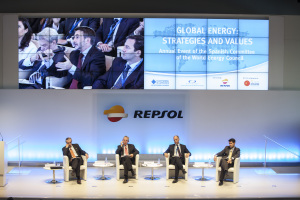Meanwhile, the world is facing various geopolitical tensions where energy is a key element of contention. These are some of the conclusions of the annual conference of WEC Spain, held in Madrid on 20 November 2014.
The meeting, under the theme “Global Energy: Strategies and Values”, reviewed some of the major topics on the international energy agenda. The event devoted sessions to analyse the relation between energy companies and human rights, the current hot spots that link geopolitics and the role of energy in the discussion on Transatlantic Trade and Investment Partnership (TTIP).
Delegates were also told that cooperation between enterprises and governments is critical in preserving human rights where the United Nations’ guiding principles have been cited as a clear framework.
During the conference the Spanish Secretary of State for Trade, Jaime García-Legaz, stated that although the energy sector has arguably one of biggest volume rates of trade, it has been far outside the rules of world trade for many reasons. However, changes in recent years have been creating a framework for energy to become a regular business in terms of trade, especially for legal security issues.

Arturo Gonzalo Aizpiri, Chair of WEC Spain, said the debate held during the conference served to reconfirm the importance of energy to international relations, and the companies in the sector are aware of this. “Global companies operate in a wide variety of countries, with highly diverse cultures, legislation and political situations. This can create opportunities and challenges whose success rests on trade agreements or investment in these businesses,” he said.
According to Rafael Estrella, Vice President of Elcano Royal Institute, the Arab Spring, China’s prodigious growth, and the Ukraine crisis have been some of the great geopolitical hot spots in recent times, adding that the increasing self-sufficiency of US energy as well as the reduction in its greenhouse gas emissions, have put Europe on the back foot in the transatlantic axis.
Europe therefore depends on external actors to ensure its energy supply, said Admiral Fernando del Pozo García, former director of the International Military Staff at NATO. The lack of integration on this issue between the Member States demands the reinforcement of its governance to reduce this dependency. The solution lies in diversifying the energy portfolio, strengthening domestic resources and fostering the use of competitive energies, the admiral said.
Dr Arturo Gonzalo Aizpiri summarised the event:
The WEC Spain event drew almost 400 attendees and gathered senior energy experts from international institutions, plus CEOs and top executives of the Spanish committee’s member companies.
– by Javier Jiménez Pérez, WEC Spain





_-80_result_688_387_s_c1_c_c.jpg)


